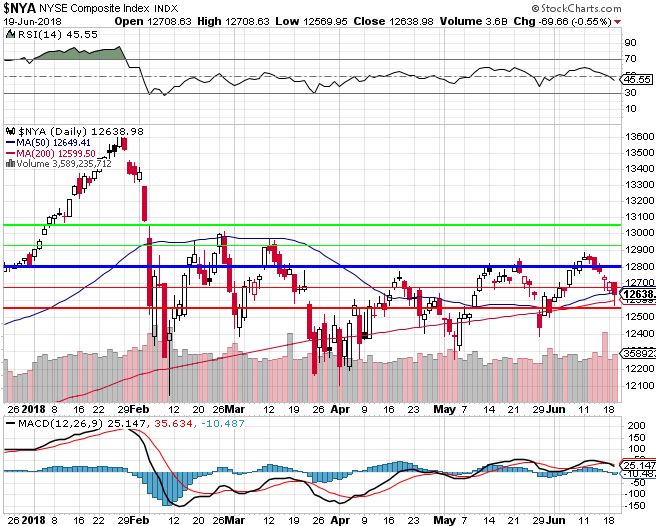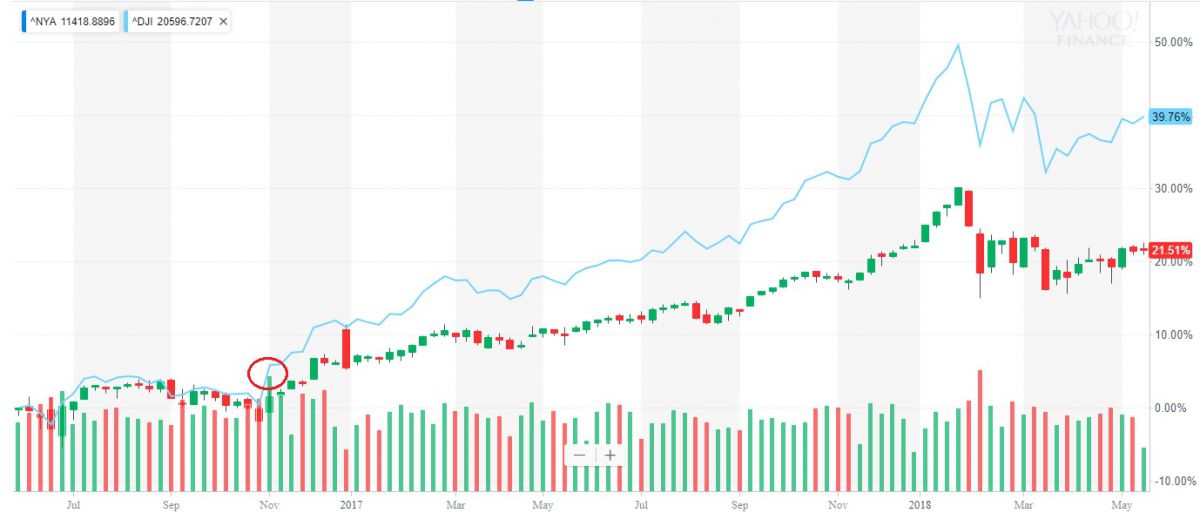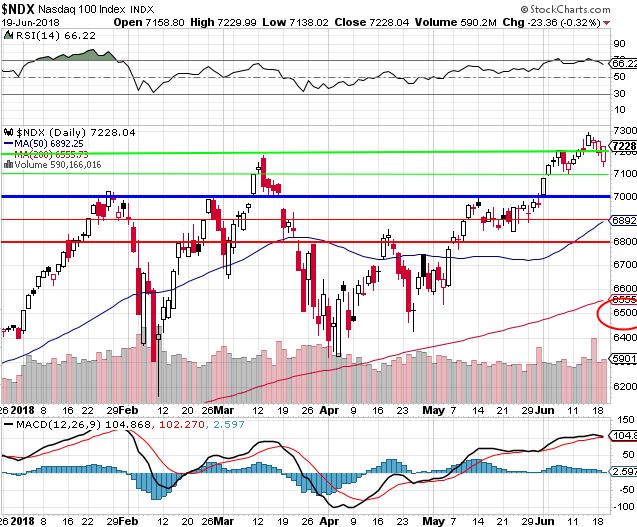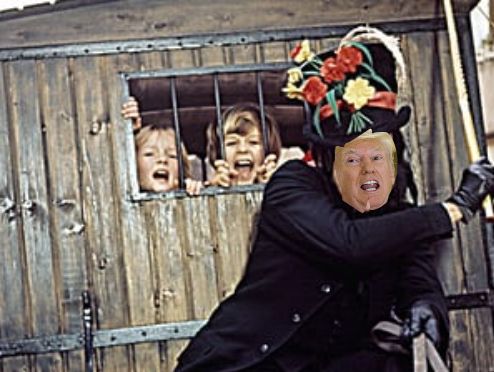 Coming back or just bouncing?
Coming back or just bouncing?
12,800 is the Must Hold line on the NYSE, meaning it's very bearish to be below that on the broad index and we finished the day yesterday at 12,638 and, so far, this morning's bounce isn't going to fix things. Back on May 26th, when the NYSE last tested 12,800, my notes from the Morning Report were:
It's still all about the NYSE and whether it's over or under that 12,800 line but I remember a time when the Dow and the NYSE would run completely neck and neck. That has gone completely out the Window as the headline index has been jammed 17% higher since Donald Trump was put in power by the USSR so thank you Putin – I guess…

The NYSE is right where we expected the market to be given that tax cuts, repatriation of capital and buybacks that have boosted the indexes over the past year plus. On the other hand, the Dow is silly and the Nasdaq is sillier and we're back to a 1998/1999 market, where Fundamentals don't matter (for now) and people are paying ridiculous forward multiples for stocks in the belief that this party is never going to stop and there's no piper to be paid. Is this time different? Don't bet on it!
The broad-market index has been trading in the lower part of a very tight range since February and, of course, the Dow is red for the year so the bulls are, at the moment, left with the over-priced Nasdaq and the narrowly-focused Russell 2000 Indexes to hang their hats on and we're still expecting a 10% correction in the Nasdaq, from 7,200 to 6,500 – before the summer ends. That's why we haven't been jumping in to buy things – we don't think these little "sales" are bargains at all.

As you can see, the Nasdaq is way up in its range, over our 7,200 mark but we're not putting on the 7,500 hats just yet as that requires Apple (AAPL) to punch up over $1,000,000,000,000 in valuation – and we don't think that's going to happen without a fight and, as I mentioned yesterday – the chance of Tesla (TSLA) being exposed as a complete disaster is far more likely – and that will cause a huge rethink of all Nasdaq valuations.
Congratulations to all who followed us on yesterday's Tesla short from the Morning Report, which was (for our STP):
- Sell 3 TSLA July $380 calls for $18 ($5,400)
- Buy 4 TSLA July $435 ($70)/$400 ($42) bear put spreads at $28 ($11,200)
Despite what we considered very obviously bad news for TSLA, the July $380 calls opened at $17.50 and finished the day at $10.85 ($3,255) for a gain of $1,995 and the $435/400 bear put spread filled at $88/56, which was the same net $28, albeit at higher prices and that closed at $84.44/50.68, which is net $30.44 so $13,504 is net $10,249 which is up $4,449 (77%) in just one day! See, we don't have to make risky day trades to make perfectly good money in a single day…
Today's day trade idea is Oil (/CL) with the Futures back up to $65.90 this morning and we'll take a short below the $66 mark with tight stops above into inventories, looking for a quick dip. Last night's API report showed an 800,000 barrel build in Oil and a 2.1Mb buid in Gasoline and a 750,000 barrel build in Distillates and oil wasn't as bad as feared so it shot up but that's silly and today is the last day of trading for the July contracts and, as of yesterday's close, there were still 27M open contracts for delivery and could you imagine the disaster if they actually accepted delivery of 27M more barrels into the glut we already have?
So we expect some dumping into the close and then there's Friday's OPEC meeting where Iran doesn't want to produce more oil but the Saudis and Russians want Trump to look good so they are going to do the puppet President a solid and increase production with the added benefit of collecting 30M more barrels a month at $60+/barrel = $1.8Bn and who doesn't love $1.8Bn – we know Trump does!
 Another thing the President loves is child-snatching and the Administration has been working overtime to justify what Wikipedia now lists as CONCENTRATION CAMPS for children that Team Trump has set up in order to further shame our once-proud Nation on the World stage. Michael Fuchs, who was the Deputy Secretary for Pacific Affairs, says we are doing as much damage to America's reputation now as we did with the Abu Ghraib tortures under Bush only the difference is that even Bush stopped things IMMEDIATELY when they came to light while Team Trump is circling the wagons and doubling down.
Another thing the President loves is child-snatching and the Administration has been working overtime to justify what Wikipedia now lists as CONCENTRATION CAMPS for children that Team Trump has set up in order to further shame our once-proud Nation on the World stage. Michael Fuchs, who was the Deputy Secretary for Pacific Affairs, says we are doing as much damage to America's reputation now as we did with the Abu Ghraib tortures under Bush only the difference is that even Bush stopped things IMMEDIATELY when they came to light while Team Trump is circling the wagons and doubling down.
Remember when this country had morals and stood for something? Ah, good times.
Unfortunately, at the risk of being censored by Seeking Alpha, I'm going to have to conclude today's Report with an excerpt from Milton Mayer's excellent book "They Thought They Were Free", which is about the rise of the Third Reich in Germany from 1933 on and how the country slowly but surely went from a proud Democracy to a facist dictatorship – simply by putting up with one atrocity (like this) after another:

But Then It Was Too Late
"What no one seemed to notice," said a colleague of mine, a philologist, "was the ever widening gap, after 1933, between the government and the people. Just think how very wide this gap was to begin with, here in Germany. And it became always wider. You know, it doesn’t make people close to their government to be told that this is a people’s government, a true democracy, or to be enrolled in civilian defense, or even to vote. All this has little, really nothing, to do with knowing one is governing.
"What happened here was the gradual habituation of the people, little by little, to being governed by surprise; to receiving decisions deliberated in secret; to believing that the situation was so complicated that the government had to act on information which the people could not understand, or so dangerous that, even if the people could not understand it, it could not be released because of national security. And their sense of identification with Hitler, their trust in him, made it easier to widen this gap and reassured those who would otherwise have worried about it.
"This separation of government from people, this widening of the gap, took place so gradually and so insensibly, each step disguised (perhaps not even intentionally) as a temporary emergency measure or associated with true patriotic allegiance or with real social purposes. And all the crises and reforms (real reforms, too) so occupied the people that they did not see the slow motion underneath, of the whole process of government growing remoter and remoter.
"You will understand me when I say that my Middle High German was my life. It was all I cared about. I was a scholar, a specialist. Then, suddenly, I was plunged into all the new activity, as the university was drawn into the new situation; meetings, conferences, interviews, ceremonies, and, above all, papers to be filled out, reports, bibliographies, lists, questionnaires. And on top of that were the demands in the community, the things in which one had to, was ‘expected to’ participate that had not been there or had not been important before. It was all rigmarole, of course, but it consumed all one’s energies, coming on top of the work one really wanted to do. You can see how easy it was, then, not to think about fundamental things. One had no time."
"Those," I said, "are the words of my friend the baker. ‘One had no time to think. There was so much going on.’"
"Your friend the baker was right," said my colleague. "The dictatorship, and the whole process of its coming into being, was above all diverting. It provided an excuse not to think for people who did not want to think anyway. I do not speak of your ‘little men,’ your baker and so on; I speak of my colleagues and myself, learned men, mind you. Most of us did not want to think about fundamental things and never had. There was no need to. Nazism gave us some dreadful, fundamental things to think about—we were decent people—and kept us so busy with continuous changes and ‘crises’ and so fascinated, yes, fascinated, by the machinations of the ‘national enemies,’ without and within, that we had no time to think about these dreadful things that were growing, little by little, all around us. Unconsciously, I suppose, we were grateful. Who wants to think?
"To live in this process is absolutely not to be able to notice it—please try to believe me—unless one has a much greater degree of political awareness, acuity, than most of us had ever had occasion to develop. Each step was so small, so inconsequential, so well explained or, on occasion, ‘regretted,’ that, unless one were detached from the whole process from the beginning, unless one understood what the whole thing was in principle, what all these ‘little measures’ that no ‘patriotic German’ could resent must some day lead to, one no more saw it developing from day to day than a farmer in his field sees the corn growing. One day it is over his head.
"How is this to be avoided, among ordinary men, even highly educated ordinary men? Frankly, I do not know. I do not see, even now. Many, many times since it all happened I have pondered that pair of great maxims, Principiis obsta and Finem respice—‘Resist the beginnings’ and ‘Consider the end.’ But one must foresee the end in order to resist, or even see, the beginnings. One must foresee the end clearly and certainly and how is this to be done, by ordinary men or even by extraordinary men? Things might have. And everyone counts on that might.
"Your ‘little men,’ your Nazi friends, were not against National Socialism in principle. Men like me, who were, are the greater offenders, not because we knew better (that would be too much to say) but because we sensed better. Pastor Niemöller spoke for the thousands and thousands of men like me when he spoke (too modestly of himself) and said that, when the Nazis attacked the Communists, he was a little uneasy, but, after all, he was not a Communist, and so he did nothing; and then they attacked the Socialists, and he was a little uneasier, but, still, he was not a Socialist, and he did nothing; and then the schools, the press, the Jews, and so on, and he was always uneasier, but still he did nothing. And then they attacked the Church, and he was a Churchman, and he did something—but then it was too late."
"Yes," I said.
"You see," my colleague went on, "one doesn’t see exactly where or how to move. Believe me, this is true. Each act, each occasion, is worse than the last, but only a little worse. You wait for the next and the next. You wait for one great shocking occasion, thinking that others, when such a shock comes, will join with you in resisting somehow. You don’t want to act, or even talk, alone; you don’t want to ‘go out of your way to make trouble.’ Why not?—Well, you are not in the habit of doing it. And it is not just fear, fear of standing alone, that restrains you; it is also genuine uncertainty.
"Uncertainty is a very important factor, and, instead of decreasing as time goes on, it grows. Outside, in the streets, in the general community, ‘everyone’ is happy. One hears no protest, and certainly sees none. You know, in France or Italy there would be slogans against the government painted on walls and fences; in Germany, outside the great cities, perhaps, there is not even this. In the university community, in your own community, you speak privately to your colleagues, some of whom certainly feel as you do; but what do they say? They say, ‘It’s not so bad’ or ‘You’re seeing things’ or ‘You’re an alarmist.’
"And you are an alarmist. You are saying that this must lead to this, and you can’t prove it. These are the beginnings, yes; but how do you know for sure when you don’t know the end, and how do you know, or even surmise, the end? On the one hand, your enemies, the law, the regime, the Party, intimidate you. On the other, your colleagues pooh-pooh you as pessimistic or even neurotic. You are left with your close friends, who are, naturally, people who have always thought as you have.
"But your friends are fewer now. Some have drifted off somewhere or submerged themselves in their work. You no longer see as many as you did at meetings or gatherings. Informal groups become smaller; attendance drops off in little organizations, and the organizations themselves wither. Now, in small gatherings of your oldest friends, you feel that you are talking to yourselves, that you are isolated from the reality of things. This weakens your confidence still further and serves as a further deterrent to—to what? It is clearer all the time that, if you are going to do anything, you must make an occasion to do it, and then you are obviously a troublemaker. So you wait, and you wait.
"But the one great shocking occasion, when tens or hundreds or thousands will join with you, never comes. That’s the difficulty. If the last and worst act of the whole regime had come immediately after the first and smallest, thousands, yes, millions would have been sufficiently shocked—if, let us say, the gassing of the Jews in ’43 had come immediately after the ‘German Firm’ stickers on the windows of non-Jewish shops in ’33. But of course this isn’t the way it happens. In between come all the hundreds of little steps, some of them imperceptible, each of them preparing you not to be shocked by the next. Step C is not so much worse than Step B, and, if you did not make a stand at Step B, why should you at Step C? And so on to Step D.
"And one day, too late, your principles, if you were ever sensible of them, all rush in upon you. The burden of self-deception has grown too heavy, and some minor incident, in my case my little boy, hardly more than a baby, saying ‘Jewish swine,’ collapses it all at once, and you see that everything, everything, has changed and changed completely under your nose. The world you live in—your nation, your people—is not the world you were born in at all. The forms are all there, all untouched, all reassuring, the houses, the shops, the jobs, the mealtimes, the visits, the concerts, the cinema, the holidays. But the spirit, which you never noticed because you made the lifelong mistake of identifying it with the forms, is changed. Now you live in a world of hate and fear, and the people who hate and fear do not even know it themselves; when everyone is transformed, no one is transformed. Now you live in a system which rules without responsibility even to God. The system itself could not have intended this in the beginning, but in order to sustain itself it was compelled to go all the way.
"You have gone almost all the way yourself. Life is a continuing process, a flow, not a succession of acts and events at all. It has flowed to a new level, carrying you with it, without any effort on your part. On this new level you live, you have been living more comfortably every day, with new morals, new principles. You have accepted things you would not have accepted five years ago, a year ago, things that your father, even in Germany, could not have imagined.
"Suddenly it all comes down, all at once. You see what you are, what you have done, or, more accurately, what you haven’t done (for that was all that was required of most of us: that we do nothing). You remember those early meetings of your department in the university when, if one had stood, others would have stood, perhaps, but no one stood. A small matter, a matter of hiring this man or that, and you hired this one rather than that. You remember everything now, and your heart breaks. Too late. You are compromised beyond repair.
"What then? You must then shoot yourself. A few did. Or ‘adjust’ your principles. Many tried, and some, I suppose, succeeded; not I, however. Or learn to live the rest of your life with your shame. This last is the nearest there is, under the circumstances, to heroism: shame. Many Germans became this poor kind of hero, many more, I think, than the world knows or cares to know."
I said nothing. I thought of nothing to say.
"I can tell you," my colleague went on, "of a man in Leipzig, a judge. He was not a Nazi, except nominally, but he certainly wasn’t an anti-Nazi. He was just—a judge. In ’42 or ’43, early ’43, I think it was, a Jew was tried before him in a case involving, but only incidentally, relations with an ‘Aryan’ woman. This was ‘race injury,’ something the Party was especially anxious to punish. In the case at bar, however, the judge had the power to convict the man of a ‘nonracial’ offense and send him to an ordinary prison for a very long term, thus saving him from Party ‘processing’ which would have meant concentration camp or, more probably, deportation and death. But the man was innocent of the ‘nonracial’ charge, in the judge’s opinion, and so, as an honorable judge, he acquitted him. Of course, the Party seized the Jew as soon as he left the courtroom."
"And the judge?"
"Yes, the judge. He could not get the case off his conscience—a case, mind you, in which he had acquitted an innocent man. He thought that he should have convicted him and saved him from the Party, but how could he have convicted an innocent man? The thing preyed on him more and more, and he had to talk about it, first to his family, then to his friends, and then to acquaintances. (That’s how I heard about it.) After the ’44 Putschthey arrested him. After that, I don’t know."
I said nothing.
"Once the war began," my colleague continued, "resistance, protest, criticism, complaint, all carried with them a multiplied likelihood of the greatest punishment. Mere lack of enthusiasm, or failure to show it in public, was ‘defeatism.’ You assumed that there were lists of those who would be ‘dealt with’ later, after the victory. Goebbels was very clever here, too. He continually promised a ‘victory orgy’ to ‘take care of’ those who thought that their ‘treasonable attitude’ had escaped notice. And he meant it; that was not just propaganda. And that was enough to put an end to all uncertainty.
"Once the war began, the government could do anything ‘necessary’ to win it; so it was with the ‘final solution of the Jewish problem,’ which the Nazis always talked about but never dared undertake, not even the Nazis, until war and its ‘necessities’ gave them the knowledge that they could get away with it. The people abroad who thought that war against Hitler would help the Jews were wrong. And the people in Germany who, once the war had begun, still thought of complaining, protesting, resisting, were betting on Germany’s losing the war. It was a long bet. Not many made it."
You either condemn or condone – there is no "silent" middle groud and SHAME on those who say "Never Again" but then hide behind "guidlines" to stop others from standing their ground!



